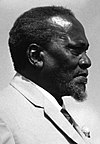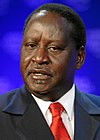Prime Minister of Kenya
| Prime Minister of Kenya | |
|---|---|
 | |
| Seat | Nairobi |
| Formation | 1 June 1963 17 April 2008 |
| First holder | Jomo Kenyatta |
| Final holder | Raila Odinga |
| Abolished | 12 December 1964 9 April 2013 |
 |
|---|
|
|
The Prime Minister of Kenya was a post in the Kenyan government. The first Prime Minister of Kenya was H.E. Jomo Kenyatta, who became Prime Minister in 1963. In 1964, when Kenya became a republic, the post of Prime Minister was abolished and Jomo Kenyatta became president. Following a power-sharing agreement in February 2008, the role was recreated in April 2008 and held by H.E. Rt. Hon. Raila Odinga E.G.H. The position was again abolished by the 2010 Constitution after the 2013 elections.
The proposed 2021 constitutional referendum would have decided whether to constitutionally reestablish the office. The process of the proposed amendments to the constitution, was declared unconstitutional by the Supreme Court of Kenya On 31 March 2022. The court also barred the Independent Electoral and Boundaries Commission from proceeding with the referendum.[1]
A similar office, that of Prime Cabinet Secretary, was established by Executive Order No. 1 of 2022 on 27 September 2022.
History
[edit]In 1 June 1963, Dominion of Kenya had her first prime minister.[2] The head of state remained Queen Elizabeth II who was represented through a governor-general in Kenya.[3] The governor-general could then select a prime minister from whichever political party that had the majority in the House of Representatives; the prime minister would be head of government; Jomo Kenyatta was elected as the first prime minister of Kenya in 27 May 1963.[4] The prime minister office was only effective up to 12 December 1964, before Kenya became a republic; Kenyatta became president.
Following the 2007–2008 Kenyan crisis, H.E. the late President Mwai Kibaki and Hon. Raila Odinga reached an agreement to form a coalition government in 28 February 2008.[5] Kibaki was to remain the head of state, while Odinga would have a new role of Prime Minister. Both would appoint half the cabinet. Both leading coalitions produced a Deputy Prime Minister Hon. Musalia Mudavadi for ODM, and Hon. Uhuru Kenyatta for PNU.[6] The prime minister office was reestablished through the National Accord and Reconciliation Act 2008.[7]
The post was abolished in 2013 after the current Constitution of Kenya was effected, which did not provide for the office of Prime Minister, making Kenya a purely presidential system.[8]
Efforts have been initiated to reintroduced the office through constitutional amendment through the Building Bridges Initiative constitutional referendum attempt.[9] On 31 March 2022, the Supreme Court of Kenya upheld the rulings of the lower courts, ruling that, "The Constitution Amendment Bill of 2020 is unconstitutional," because President Kenyatta [Uhuru] initiated the amendments through his creation of the Presidential Taskforce on Building Bridges to Unity Advisory, and vocal endorsement of the legislation crafted based on their findings.[10][11]
Prime Ministers of Kenya (1963–1964; 2008–2013)
[edit]- Political parties
| No. | Picture | Name (Birth–Death) |
Elected | Term of office | Political party | ||
|---|---|---|---|---|---|---|---|
| Took office | Left office | Time in office | |||||
| Prime Minister of Kenya (1963–1964) | |||||||
| 1 | 
|
Jomo Kenyatta (1891–1978) |
1963 | 1 June 1963 | 12 December 1964 | 1 year, 194 days | KANU |
| Prime Minister of Kenya (2008–2013) | |||||||
| 2 | 
|
Raila Odinga (born 1945) |
— | 17 April 2008 | 9 April 2013 | 4 years, 357 days | ODM |
See also
[edit]- Politics of Kenya
- Prime Cabinet Secretary
- List of heads of state of Kenya
- List of colonial governors of Kenya
References
[edit]- ^ "Kenyatta in steep and precarious journey towards June referendum". The East African. Retrieved 8 February 2021.
- ^ "On this day in history: Jomo Kenyatta was elected Prime Minister of Kenya". Retrieved 31 October 2022.
- ^ History of Constitution Making in Kenya. Konrad Adenauer Stiftung. 2012. pp. 1–23.
- ^ "Kenyatta elected Kenya's First Prime Minister". 27 March 1963. Retrieved 31 October 2022.
- ^ "Key points: Kenya power-sharing deal". BBC News. 28 February 2008. Archived from the original on 3 March 2008. Retrieved 31 October 2022.
- ^ "Kenyan leader signs power-share law". Al Jazeera English. 19 March 2008. Archived from the original on 1 October 2008. Retrieved 1 March 2021.
{{cite web}}: CS1 maint: unfit URL (link) - ^ "No. 4 of 2008 Act Title: NATIONAL ACCORD AND RECONCILIATION". Kenya Law. 20 March 2008. Retrieved 31 October 2022.
- ^ "The Presidential System of Government in Kenya". Retrieved 31 October 2022.
- ^ Gachuri, Francis (22 October 2021). "BBI Proposes The Creation Of The Office Of Prime Minister And Two Deputies". Citizen Digital. Retrieved 31 October 2022.
- ^ "Kenya: Supreme Court blocks controversial constitutional reforms". www.aljazeera.com. Retrieved 31 October 2022.
- ^ "Supreme Court final orders on BBI as it declares it unconstitutional". Citizen Digital. 31 March 2022. Retrieved 31 October 2022.
External links
[edit]

